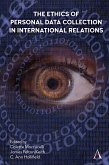Can ethics be hacked? Can new and unexpected meaning be found in or behind established traditions of moral discourse? Does not the digital transformation challenge us to develop a digital ethics that is just as disruptive and transformative as the technologies it proposes to regulate? Would ethical hacking be the same as hacking ethics? This book attempts to answer these questions. The occasion for this attempt is the digital transformation, the advent of a global network society, the big data revolution, datafication, and whatever other terms come to mind to describe our present historical moment. In the face of this changing reality, ethics has attempted to become digital ethics. No area of personal or social life is not conditioned by the digital and everything that it stands for and everything it brings with it. Marx would probably have been overjoyed to learn that very soon there will be no more workers since robots will do the work, that everyone will own the means of production, that is, their own creativity and skills, and that a sharing economy will largely replace capitalism. But would he be happy about the prospects of a posthuman or even transhuman world in which not only intelligence but also agency and identity are distributed among heterogeneous networks of humans and nonhumans? Would he be happy at the prospect of a data-driven society in which decisions are made based on evidence and not intuition, gut feelings, cognitive bias, prejudice, experience, and inherited assumptions? Indeed, not only Marx but practically no theory or world view that has arisen within the modern period, including ethics, finds itself able to cope with the new digital world order. Instead, we are experiencing in all areas the defensive reaction of Western industrial society to the disruptive influences of digital technologies. The world is changing. The digital transformation disrupts traditional forms of order, whether it be the order of knowledge, the order of cooperative action in social organizations, or the self-understanding of human existence.
The world of Western modernity is disappearing and a new world, let us call it a global network society, is emerging in its stead. For established institutions and habits of thought, this is a threatening and highly uncertain situation. Facing up to this situation does indeed have an ethical dimension; it does call for ethics. But an adequate moral response to this situation is not and cannot be merely applying traditional values and norms to digital technologies. Nonetheless, the current discourse of digital ethics consists almost entirely of attempts to apply traditional normative ethics to the development and deployment of new technologies. The thesis of this book is that no amounts of rights and duties, of moral norms and ethical imperatives, no list of ethical guidelines or principles of good AI or ethical big data are going to have the slightest effect if they do not leave the presuppositions, convictions, and traditions of Western industrial society behind and embark upon exploring a new world with new values and new forms of responsibility and accountability. This is the challenge of hacking digital ethics. The hack, from this point of view, consists of breaking into the codes of traditional moral discourse and redesigning things so that something like digital ethics can appear unconcealed from the outworn and concealing veil of modernity.
Perhaps, despite all the publicity and attention, the hasty founding of institutes, centers, and departments for digital ethics, the activism of non-profit organizations, and the flood of guidelines, declarations, and programs supporting ethical design, development, and deployment of technology there currently is no such thing as digital ethics. There is only modern Western ethics, that is, ethics that arose within modern Western society, that is, within a no longer viable social order and a passing historical moment. It could be that a uniquely digital ethics is waiting for the hack to come into view for the first time. One could even go so far as to claim that ethics today is fundamentally dependent upon the hack and not the other way around. It is not hacking that needs ethics; it is ethics that needs hacking. Could such an endeavor be judged by the standards it leaves behind? Can the global network society be judged by the standards of Western industrial society? What new norms take the place of the old ones? And what does ethics become, when it no longer answers to the questions of the world in which it was formed, which defined what it was, and which, whether we like it or not, no longer exists? This book is an attempt to answer these questions and open up the possibility of a digital ethics capable of addressing the problems of the global network society.
The world of Western modernity is disappearing and a new world, let us call it a global network society, is emerging in its stead. For established institutions and habits of thought, this is a threatening and highly uncertain situation. Facing up to this situation does indeed have an ethical dimension; it does call for ethics. But an adequate moral response to this situation is not and cannot be merely applying traditional values and norms to digital technologies. Nonetheless, the current discourse of digital ethics consists almost entirely of attempts to apply traditional normative ethics to the development and deployment of new technologies. The thesis of this book is that no amounts of rights and duties, of moral norms and ethical imperatives, no list of ethical guidelines or principles of good AI or ethical big data are going to have the slightest effect if they do not leave the presuppositions, convictions, and traditions of Western industrial society behind and embark upon exploring a new world with new values and new forms of responsibility and accountability. This is the challenge of hacking digital ethics. The hack, from this point of view, consists of breaking into the codes of traditional moral discourse and redesigning things so that something like digital ethics can appear unconcealed from the outworn and concealing veil of modernity.
Perhaps, despite all the publicity and attention, the hasty founding of institutes, centers, and departments for digital ethics, the activism of non-profit organizations, and the flood of guidelines, declarations, and programs supporting ethical design, development, and deployment of technology there currently is no such thing as digital ethics. There is only modern Western ethics, that is, ethics that arose within modern Western society, that is, within a no longer viable social order and a passing historical moment. It could be that a uniquely digital ethics is waiting for the hack to come into view for the first time. One could even go so far as to claim that ethics today is fundamentally dependent upon the hack and not the other way around. It is not hacking that needs ethics; it is ethics that needs hacking. Could such an endeavor be judged by the standards it leaves behind? Can the global network society be judged by the standards of Western industrial society? What new norms take the place of the old ones? And what does ethics become, when it no longer answers to the questions of the world in which it was formed, which defined what it was, and which, whether we like it or not, no longer exists? This book is an attempt to answer these questions and open up the possibility of a digital ethics capable of addressing the problems of the global network society.
Dieser Download kann aus rechtlichen Gründen nur mit Rechnungsadresse in A, D ausgeliefert werden.









